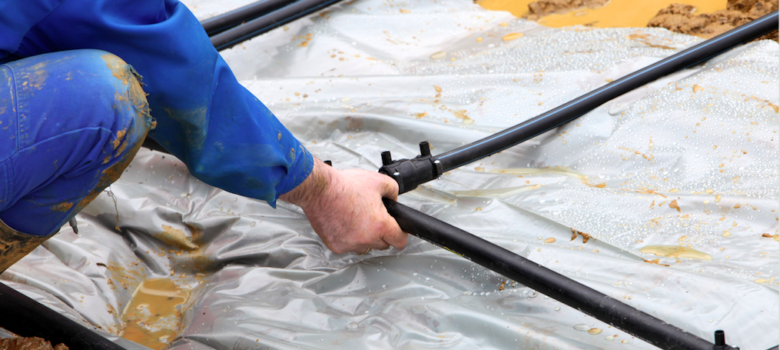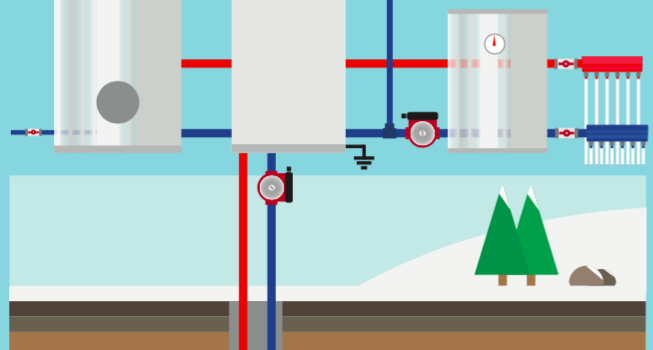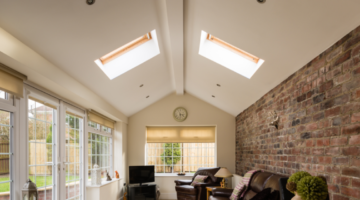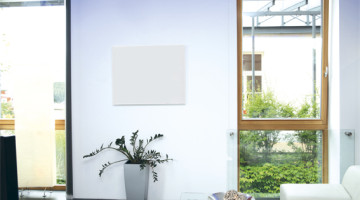
Ground Source Heat Pumps (GSHP) are a great way to heat a modern home, especially if you are off the gas grid. They do require a bit of room in the garden though, so they aren’t for everyone!
How does a GSHP work?
Heat pumps are designed to move heat from one place to another, even when the source is colder than the room you are trying to heat! It may seem a little counter intuitive, but heat pumps work just like your fridge or freezer, but in reverse. In a GSHP, a refrigerant liquid is pumped around pipes laid in your garden, absorbing the latent heat in the ground. This heat is then released into your home after being amplified by a compressor.
GSHPs are great because the temperature of the ground is pretty much constant throughout the year, unlike an air source pump, which relies on there being some warmth in the air to operate efficiently. As such, GSHPs operate at a very similar level of efficiency all year round, and will always be more efficient than an air source equivalent.
The trickiest and most expensive part of a GSHP installation is laying the pipework under the ground. There are 2 ways to do this. You can lay the pipes in trenches running up and down the garden (horizontal collectors), or you can drill a borehole and sink the pipe way down in the ground.
Clearly, laying trenches is much cheaper than boreholes. Boreholes cost a small fortune to dig, and reinforcement will be required to prevent the hole from collapsing on itself. The cost of this is often £10-15k. However, there are some benefits of having the borehole.

Also note that to drill a borehole a very large piece of drilling machinery is required. If your garden is inaccessible to vehicles then it may not be possible to get the drill into the garden.
Local geology can make a difference
For horizontal collectors, the ground needs to hold water well to be most effective. Even at 1.5m deep which is the typical depth for a trench, the temperature can vary season to season, and the geological conditions can make the difference. Your installer should be able to advise if your property is suitable for a horizontal collector.
Because boreholes go deeper, the temperature is very consistent, so you won’t have any variation in efficiency at all between seasons. This makes borehole heat pumps great for cooling in summer, as well as for heating in winter.
Which is better: boreholes or trenches?
This is really a tricky one to give a definitive answer to. It really will depend on the heating and cooling requirements of the property, the geology and local conditions, room available, costing and aesthetic considerations in the garden.
Whichever route you go down, though, ground source heat pumps are is a great way to heat your home. Remember that there is a very generous RHI grant available from the government for this type of system, and you will definitely see considerable savings on your heating costs when compared to other off grid heating like oil boilers.
Could I save money with a ground source heat pump?
| Technology | Expected Savings with GSHP/yr |
|---|---|
| Gas Boiler (G Rated) | £600 |
| Gas Boiler (A Rated) | £100 |
| Storage Heaters (Older) | £800 |
| Storage Heaters (Modern) | £500 |
| Oil boiler (G Rated) | £400 |
| Oil boiler (A Rated) | Increase of £50 |
| LPG Boiler (G Rated) | Increase of £1,100 |
| LPG Boiler (G Rated) | Increase of £400 |
*Figures approximated based on an average house. Savings will vary.
Installing heat pumps
Are you thinking about getting a heat pump? We have scoured the country for the best tradespeople, so that we can make sure we only recommend those we really trust.
If you would like us to find you a local heat pump installer, just fill in the form below and we will be in touch shortly!













I would be very careful about installing GHSP in an older property unless it has been insulated to a good standard and is going to supply to underfloor heating not radiators. GHSPs are best suited to new homes or those that are well insulated and don’t have a high heat demand.
Even if supplying to underfloor heating, not existing rads, in an old property with poor insulation you’ll need a hotter floor than the system is designed to run efficiently at, to get the room warm enough.
There are plenty of tales to read on the internet of people being mis-sold GSHP heating and regretting installing into old properties.
This article is remiss in not making the point about likely unsuitability to older poorly insulated properties.
Hi John,
Thanks for your email. Whilst this article may not explicitly make this point, we do mention the fact that old properties will need significant upgrades in many of our heat pump blogs. For example – if you take a look at this blog: https://www.thegreenage.co.uk/consider-insulating-home-installing-heat-pump/
Kind Regards,
Alan
I live in an urban area where a ground source heat pump would need to be a deep bore system due to the close proximity of other residences. As I have a front lawn measuring5 metres by 4 metres can this be accomplished. Currently I have a gas fired condenser boiler. What is the cost and due to the deep bore is that subject to any planning regulations or orders as any equipment needed will have to be sited on the public roadway.
What are the minimum depths required for bore holes for 40mm diameter flow and return pipes